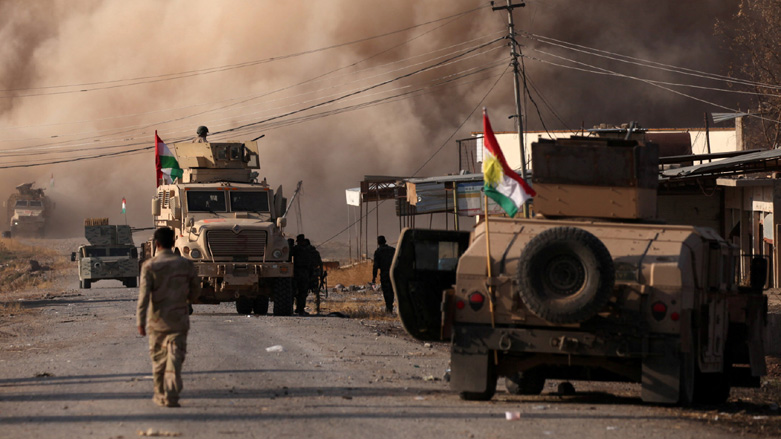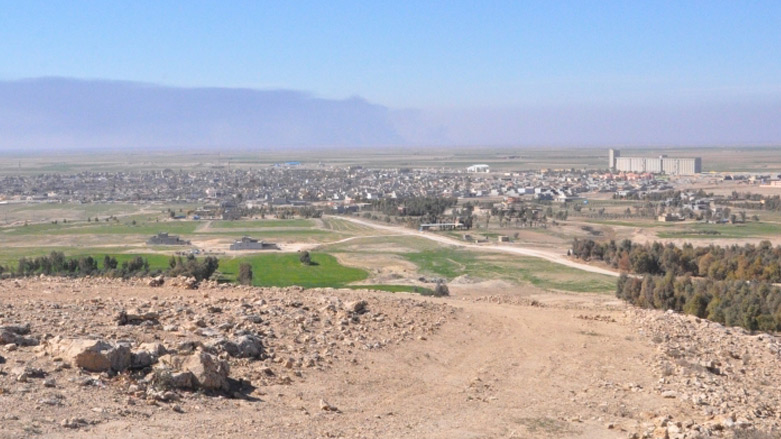Coalition sees more joint operations between Peshmerga and Iraqi forces

WASHINGTON DC (Kurdistan24) – Gen. Joseph Votel, the Commander of CENTCOM, which oversees the fight against the Islamic State (IS) in Iraq and Syria, praised Monday’s joint military operation between the Peshmerga and the Iraqi Security Forces (ISF) against IS, which was also backed by forces from the US-led coalition, formally known as Combined Joint Task Force-Operation Inherent Resolve (CJTF-OIR.)
Speaking to Pentagon reporters via teleconference from CENTCOM’s Florida headquarters on Thursday, Votel praised the “very successful” action, involving Iraq’s “federal police and the Peshmerga,” who worked “together to eliminate the presence of [IS) in an area between their forces.”
Since Iraq’s attack on Kirkuk and other disputed areas last October, in an operation engineered by Qassim Soleimani, head of Iran’s Islamic Revolutionary Guard Corps, IS has reemerged in what Coalition officers call “the seams” between the two forces.
Commanders from CJTF-OIR have been working for some time to restore cooperation between the ISF and Peshmerga, and as Votel said on Thursday, “We certainly hope” there will be more such joint operations.
The CENTCOM Commander suggested that Monday’s “very successful operation,” in which the two forces “collaborated quite well,” sends “the right signals” and helps to “create the conditions” that “allow these two elements of the (ISF) to work together effectively in the future.”
Iraq’s assault on Kirkuk created a great deal of bitterness among the Kurdish forces toward their erstwhile Iraqi partners, and the consequences linger.
Sirwan Barzani, Commander of the Gwer-Makhmour front, described Monday’s offensive to Kurdistan 24 as a joint operation with CJTF-OIR, rather than the ISF. He said that Canadian, American, and Belgian Special Forces were involved, as well as Coalition warplanes, which opened the attack by bombing targets on Mt. Qarachukh.
Votel revealed some other news as well. NATO is becoming more involved in Iraq and is significantly expanding its mission there. It “will achieve operating capability this fall,” he said.
NATO will not replace the US-led coalition, however. Rather, it will operate parallel to it.
NATO’s operation is a training mission that will function “in coordination with CJTF-OIR and does not replace it,” Pentagon Spokesman, Sean Robertson, told Kurdistan 24.
“CJTF-OIR will continue to focus on the eradication of remaining [IS] elements and training of ISF units and personnel,” Robertson explained via e-mail, “while NATO provides capability to enhance the institutional development and training of the ISF, building upon NATO’s existing capacity building efforts in Iraq.”
Canada has volunteered to lead the effort, as NATO Secretary General Jens Stoltenberg announced at last week’s NATO summit in Brussels.
Votel explained that the initiative grew out of discussions between US Secretary of Defense Jim Mattis and Stoltenberg. It is consistent with the insistence of US President Donald Trump that other countries bear a greater share of the common defense burden.
Although NATO’s efforts will focus on training—and not combat—the Iranian-backed militia, Asaib Ahl al-Haq, nonetheless responded by threatening violence, as it warned, “We reject the presence of any combat force on the ground.”
Votel also detailed the most recent activity of the Kurdish-led Syrian Democratic Forces (SDF), which earlier this week liberated the Dashisha area, along the Iraq-Syria border.
He explained that CJTF-OIR’s policy was not to encourage the SDF to engage with the Syria regime, even as it recognized there could be a “pragmatic” need for such engagements.
In addition, the “road-map” for the Syrian city of Manbij, agreed upon between Washington and Ankara, is about to take another step forward.
Presently, Turkish troops patrol north of the city, while CJTF-OIR troops patrol, independently, south of the city.
“We will soon begin the necessary training to conduct joint combined patrols along portions of the demarcation line,” Votel said. That line separates Turkish troops and their local allies, from coalition forces and their local allies.
Turkey has long pressed the US for the swift implementation of the “road map.”

